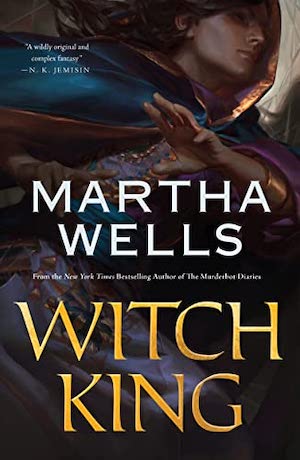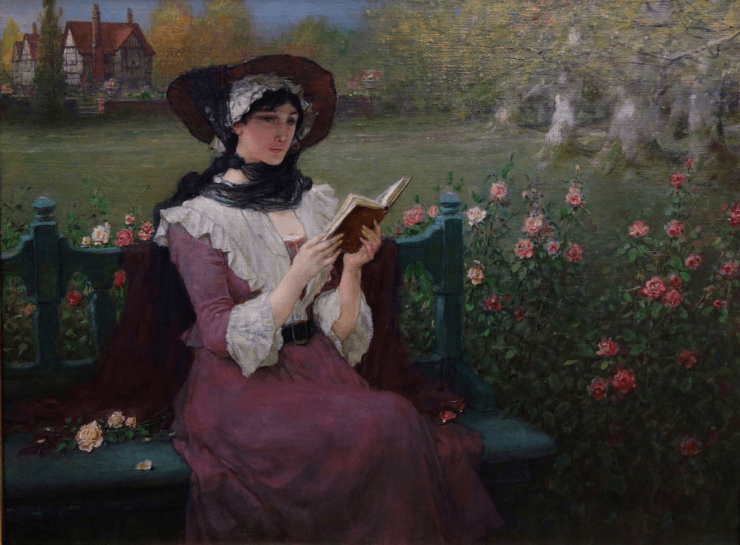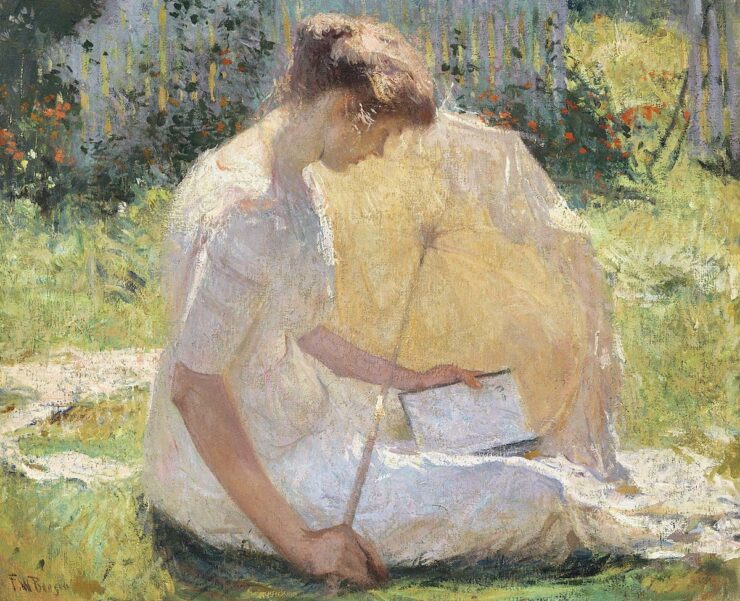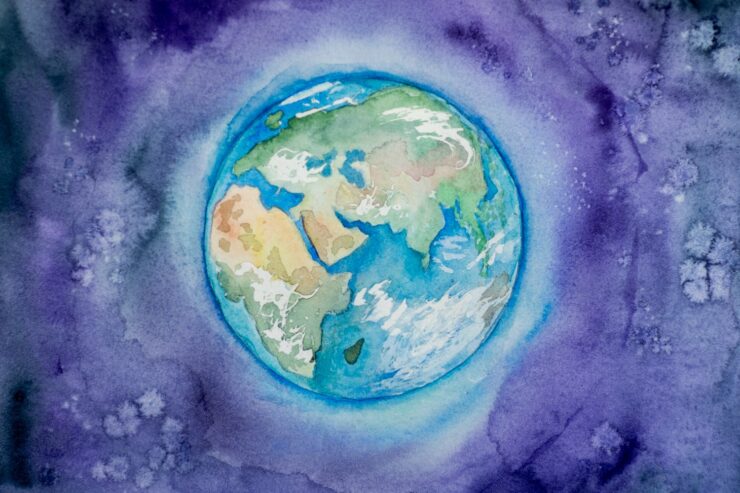In January, I made a new stack of books. It was comfort food, in part—fantasy, YA series, novels by friends and acquaintances, the lightest stories I could find in my to-be-read stacks. It was what I thought I’d be up for in the next month, books pulled off the shelves ahead of time because after a specific date in early February, I wasn’t going to want to wrangle books out of teetering piles or try to find things on shelves. I was going to be recovering, recuperating, resting—endlessly resting, a privilege that should be a right, after having surgery.
I read almost none of those books. Physically, I was in unfamiliar territory. And it turned out that my reading mind wanted to be there too.
In hindsight, this makes a perfect kind of sense, but at the time—as I picked up and put down books, bored with bland descriptions, frustrated with magic systems, fed up with fun—I didn’t know what to do about it. I wanted something but could not name it. I read the first Star Wars: The High Republic book at the end of January and thought I would keep going; after one more, I couldn’t pay close enough attention to keep track of the incredible proliferation of Jedi with extremely Star Wars names. (This was very much an “it’s not you, it’s me” problem and no fault of the books.)
Reading what I usually read was like wearing clothes that didn’t fit right. It wasn’t quite like in the early pandemic, when reading at all felt impossible. It was more like I was looking for a flavor I didn’t even know how to recognize.
Habits are strange things, quirky, personal, deeply ingrained, built on accident or by determined purpose. Reading habits, I think, are like that, too: You can wander into a reading habit or build one the same way you build any other habit, and that includes what you read, not just that you read. Some of my reading habits have existed since childhood (magic stories all the time) and some developed at different times in my life: learning to focus in short bursts on the subway, for example, or trying (and often failing) to read in the morning before looking at the internet.
So when all my regular habits—right down to where and how I slept, how I sat, how I could move—were put on pause, everything felt off. I did not want lightweight books with fun stories; I wanted things that would forcefully tug me through the pages. I wanted to be bossed around by books, to be led in strange directions, to be sat down and made to listen. I read the tense thriller The Janes by my college neighbor Louisa Luna, though I generally do not lean toward books about murdered girls (exceptions are made for certain detective types, and Luna’s Alice Vega is one of them). I reread two Percy Jackson books because that rocketing middle-grade pace was incredibly bossy to my exhausted brain, and it kept me focused. I read Magic for Liars and Crooked Kingdom because they were partly familiar ground (magic!) but also had one foot in a different territory (mystery! cons!).
And when I felt a little bit more like myself again, I read Postcards From the Edge and The Falconer back to back, lingering in other decades, other cities, hanging out with people who went out and did things. Then, two Murderbot novellas. And then, at the end of the month, a challenge: Chuck Wendig’s Wayward.
Why was Wayward a challenge? Because it’s exactly the kind of thing I usually read, and I was still not exactly myself. I read it over four days while I tried to get used to the idea of “normal” life resuming for me. Feeding the cats. Logging on to work. Walking more than just laps around the house, taking more and more steps, remembering to move.
“Normal” is a weird idea, sometimes. It suggests something steady, maybe even static: things that are given, things that don’t change. But everything normal changes, and everyone’s normal is different. Things that seem normal one week might be impossible the next. Normal is a moving target that we set for ourselves, or reject outright.
Part of what I am trying to say here is that when reading is a huge part of your life—when stories carry you through things, or take you out of things, let you escape or feel at home—there’s a quality of normality in those patterns, too. My days got rattled, and my reading with them. Each time I went back for another book, slowly making my way back towards my regular territory, I asked myself questions: What do you want? What do you really need? Is it something other than what you’ve been giving yourself?
I have a dubious habit of reading the acknowledgements in books before I finish them, but for whatever reason, I didn’t do that with Wayward. So when I got to the end, I found Wendig’s afterword about writing a pandemic book during a pandemic, and how it was hard and weird. He writes:
I did it by resting.
I did it by giving myself the time to rest.
I did it by treating myself gently and practicing the kind of self-care that isn’t just “eat ice cream, you deserve it” (though I did eat ice cream whether or not I deserved it) but instead added up to something less indulgent and more stern. It was the kind of self-care that said I need to do this, and not doing it would not be kind to myself. I love writing and writing is a kindness to myself, but doing it means taking it gently, taking it slow. I treated it like physical therapy of a sort: Healing a broken leg doesn’t mean never ever walking on it again. It means keeping off it until the time comes that you have to make it bear weight again. And even then you don’t just fucking breakdance. You use a crutch. (We use crutch as a pejorative, which shows you just how we think of disability and assistive devices.) You move slowly. You take lots of breaks. You go a short distance today, maybe a little tiny itty bit farther tomorrow.
Later on the page, he continues, “Life is short. The world is mad. Relish in the triumphs; make the small ones feel huge, make the huge ones feel legendary.”
Wayward is a good book. But at the end of one of the stranger months of my life, this, more than any novel, was what I needed. I was not writing a book, not while recovering; I was just getting through the days. Resting was how I had to be kind to my physical self for that month. And because bodies and brains are linked, resting meant stepping away from all kinds of things that usually suit me and make me happy. Including what I read.
Buy the Book


Witch King
One of the things that often gets lost in our culture’s productivity pressure, in our rat race, is that we need fallow time, to let things sit, let them stew. To recover. Sometimes that’s physical, sometimes it’s mental, sometimes it’s both; sometimes it’s about a project or a friendship or a relationship to a place. Rest doesn’t always result in lightbulbs popping on the minute you get back up again, though—muscles can be stiff, a bit unsteady, thoughts swirling in slightly new shapes.
Not reading my normal books, not thinking my normal thoughts, not doing my normal things: they were all of a piece. It’s a piece I think a lot of us are familiar with, at some point in our lives when we have to let our “normal” go for a while. Maybe while recovering; maybe while mourning; maybe just while struggling more than usual. It is hard, in a culture that over-values doing and producing and productivity at all costs, to find yourself forced to slow down, even to stop. (It’s also a privilege to be generally able-bodied, to be able to swim in that crushing current even if one would prefer not to.)
What I’m going to take away from this fallow time remains nebulous, something body and mind are still learning. But part of it is a reminder that stories, like days, fit together in all kinds of shapes—whether you are reading them, or writing them, or trying to do both. Part of it is that rest and kindness take different forms and unlock different things. Part of it is that treating ourselves gently is not just something we can do for our bodies, but for our minds, our habits, our hopes.
Let the small triumphs be massive. Turning a page. Opening a door. Taking a breath.
Molly Templeton lives and writes in Oregon, and spends as much time as possible in the woods. Sometimes she talks about books on Twitter.














